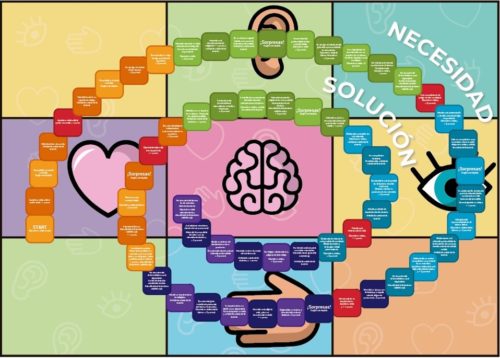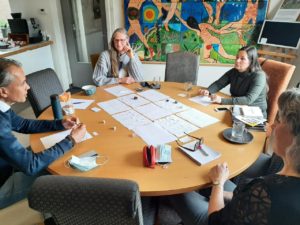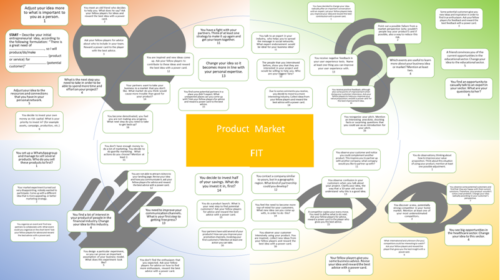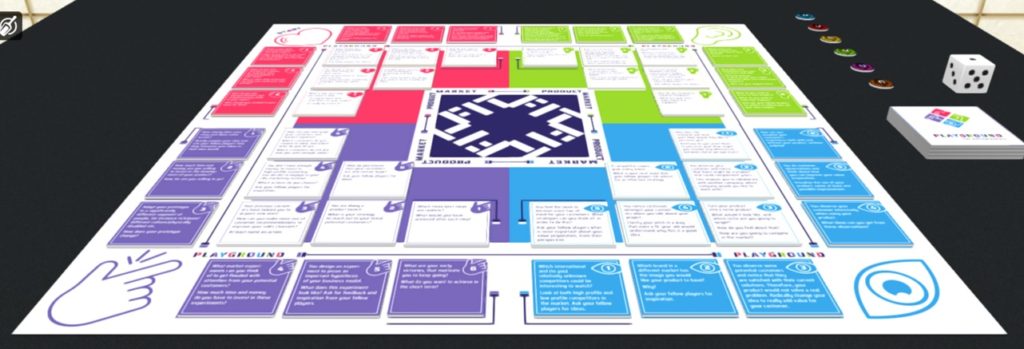So in my journey helping both entrepreneurs and coaches, creating another canvas just fell short. It didn’t really seem to create an additional value, compared with the tools and methods that already existed. From what I had explored, there was definitely an opportunity to support coaches in their profession, getting to better and more innovative ideas as well as better experiments. But it was not going to happen through just another model or framework.
That’s when the idea for a board game came up. Games inherently are interactive and bonding. They invite experimentation and risk taking is not that scary in a game-like setting. The parallel world the players are in invites playing around with thoughts and ideas that might not come up in a real-life setting. And that is indisputably an attitude you would want to see in an entrepreneur; experiments, new ideas, and the ability to take a look from different perspectives. This way an entrepreneurial vision can be constructed over time.
Now, this was the first version of the game.

Game or Coaching Tool?
The problem with this first prototype of the game that came up is that it really is the game of the goose. It was competitive, but would depend largely on luck and there were practically no strategic decisions. It also had some more complicated elements involved, like a wheel of fortune. The thought behind this was that entrepreneurship would have an element of decision (how you would answer each question), but also a big luck factor.
At this point, we still had some decisions to make in order to really define the value of the game. Would it be something you would play on a rainy Sunday afternoon for fun, and, would also coincidentally teach you some entrepreneurial thinking? Would it be addressed to people interested in entrepreneurship, but without a team or an idea? Or to actual entrepreneurs trying to figure out the first somewhat interesting business model? Would there be any involvement of a coach or teacher-like figure?
Just showing this to people, both entrepreneurs and coaches, made it very clear that this game-of-the-goose-like board wouldn’t really create value for them. So I evolved the questions a bit more and made them more reflective, taking out the clear path and letting players decide for themselves where they needed to go. I came up with a paper prototype that we actually played in a couple of test sessions.

Playtesting the Game
Now, this was a really important step in the development of the game. The questions and the conversations they generate are basically its essence. Time management resulted key – In the first session we actually spent about 2 hours on just 6 questions or so. Very insightful, but not very dynamic. Balancing insightful conversations with interaction and a game-like experiencel. Or at least, instructing coaches so that they would be able to make conscious decisions about it. Even though it definitely generated interesting and valuable conversations, we needed to optimize space, and mechanics as well as to refine the questions.
This also meant making a conscious choice where the Playground would be at on the scale of coaching tool to actual game. Gamification has been hot for a while, but sometimes it is also overdone. Too many game elements might cause superficiality when actually trying to get a message across. Or in this context, entrepreneurs come to their own conclusions and insights, as well as being inspired by others.
This was the next version.

Creating Insightful Conversations
With this version, we playtested quite a lot. I experimented with more tight and more loose facilitation, different ways of managing time, etc. Now we were reasonably sure about its value, we were ready to actually design it in a more esthetical way. A designer joined the team and we came up with this.

At this point everything seemed to come together. There were lots of positive comments about the design, especially the use of vivid colors. We still edited the questions a bit more based on the experiences with playtesting . We still experimented with game instructions and varied game mechanics, especially to fit different audiences. Generally, everything was working as it should and adding value to conversations.
Through playtesting also an additional value came up. Every time we played the game, a strong sense of empathy and willingness to help each other came up. This went way beyond the general watercooler type of conversation. Players were giving each other feedback, ideas, and examples, offering each other help. This sense of community, especially when played repeatedly, is worth gold for coaches and any organization that supports entrepreneurs.
Of this last version, we had 20 prototypes printed that we sent out all over the world for feedback and testimonials. Plus the online version of the game on Tabletopia. Even though there was still loads of testing to be done with game instructions, varying dynamics and creating coaching processes based on the game, the design of the actual physical product was concluded.
Be Part of the Journey!
Now that you are reading this we’re almost ready to launch. Entrepreneurship coaches and teachers all over the world have been testing the prototype, joining us on this journey and every time we understand a bit more about the value the game generates. As we are planning to mass-manufacture soon, this is also YOUR CHANCE to join us on this journey. The game is available now (buy the game) and bring your coaching to the next level.
I hope you enjoyed the story!